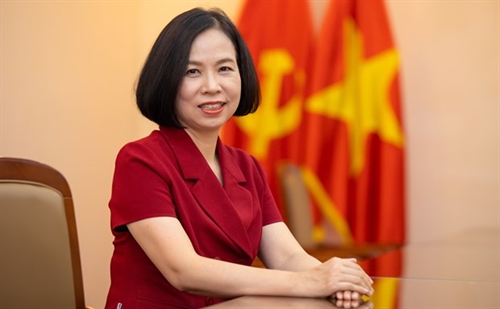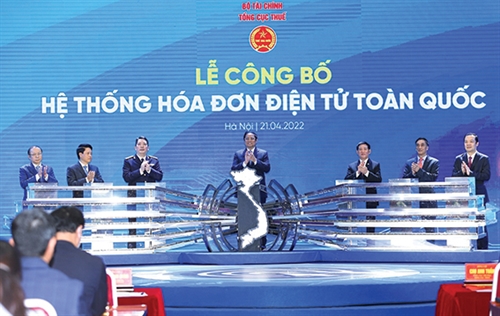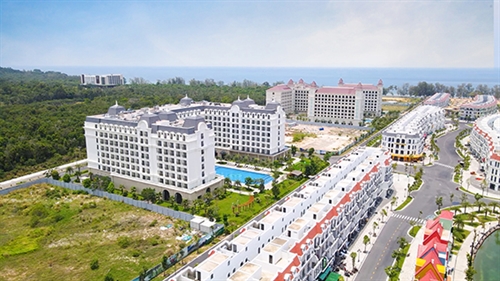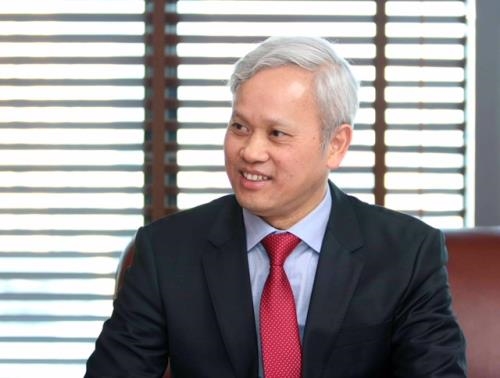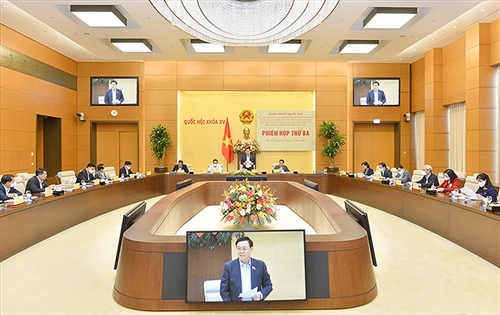The 2019 Labor Code (the Code), effective as of January 1, 2021, lays a foundation for development and implementation of the country’s industrial relations system, which is more consistent with the principles of the market economy and serves the country’s integration and strong development. The Code touches upon key principles for freedom of association and independent workers’ representative organizations, but there is an increasing concern that would not suffice, especially, in the context of Vietnam. This article examines key challenges to freedom of association in the country and explore future perspectives of the right to association.
Nguyen Hoang Ha, Ph.D[1]
Legal framework for freedom of association in Vietnam
With regard to human rights protection, freedom of association (FOA) is defined as a basic right stipulated by the 2013 Constitution of Vietnam (Article 25). However, that constitutional right could only be brought into full effect if it should be enforced by a specialized law. The last version of such a draft law was posted for public comment on the website of the National Assembly dating back on October 24, 2016.
In the realm of work, the Code records the birth of workers’ representative organizations operating independently from the Vietnam General Confederation of Labor (VGCL) (Articles 170, 172, 173 and 174), marking another big step forward on the legal framework to help Vietnam get closer to the International Labor Organization (ILO) Convention No. 87 on Freedom of Association and Protection of the Right to Organize Convention, 1948. Although it has numerous innovative regulations, the Code still exposes certain limitations.
First, with regard to the right to FOA, the Code (Articles 170 thru 178) has established the rights of workers to establish or join their representative organizations at the enterprise level in two ways, that are to establish or join a workers’ representative organization registered with a competent state agency and/or establish or join a trade union within the scope of the Trade Union Law. The Code does not mention the establishment of a workers’ representative organization at a higher level such as sectoral, regional or international level. The right to FOA at the upper level of the enterprise is a natural and inevitable demand of all workers’ representative organizations. This right has only been agreed upon in the commitment on FOA in the Comprehensive and Progressive Agreement for Trans-Pacific Partnership (CPTPP), whereby Vietnam has five years to prepare a legal environment from the date of entry into force of the Agreement (January 14, 2019). So from that date to 2024, Vietnam does not have much time, while that regulation requires creating a favorable legal environment to ensure compliance with those commitments on FOA.
Second, as for the settlement of labor disputes, Vietnam has sought to reduce state administrative interference in industrial relations, creating conditions for the concerned parties to proactively reach an agreement and promoting negotiations for them to settle labor disputes. The Code has abolished the authority to settle labor disputes regarding the rights of chairpersons of district-level People’s Committees (previously specified in the 2012 Labor Code) and added the authority to settle collective labor disputes of the Labor Arbitration Council. However, with the interdisciplinary task force still being mandated to operate aiming to stop collective actions/strikes, the Code has not really found any “comprehensive solution” to the challenges of illegal or wildcat strikes of workers.
Third, the list of industries where strikes are not allowed, as provided together with Decree 145/2020/ND-CP guiding the implementation of the Code, is more extensive than international practices. For that reason, they are not compatible with the key principles of FOA of the ILO, according to which strikes may only be banned in essential service industries, which, if interrupted, would seriously affect the life, safety and health of the whole or part of the population.
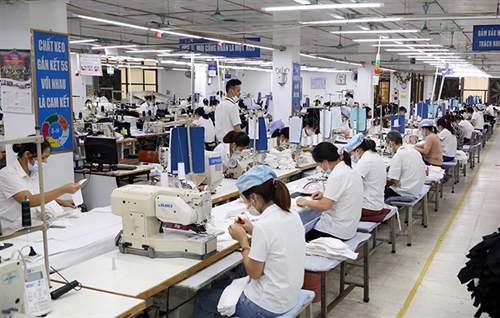 |
| A production line of GARCO 10 JSC. Company__Photo: VNA |
Work in progress in Vietnam
The Government has been working closely with different stakeholders to prepare a draft decree guiding the establishment and operation of workers’ representative organizations at the grassroots level. That decree is vital to activate the Code’s provisions (Articles 170, 172, 173, 174, 177 and 178) regarding workers’ representative organizations in Vietnam. By law, grassroots trade unions and workers’ representative organizations have equal rights and obligations as described in the Code’s Article 178 in protecting the lawful rights and interests of workers in industrial relations. Accordingly, the rights and obligations of a workers’ representative organization include:
(i) to conduct collective bargaining with the employer;
(ii) to conduct dialogue at the workplace;
(iii) to be consulted during the development of the wage scale, wage table, work norms, regulations on pay and bonus, internal working regulation, and issues relating to the rights and interests of workers who are its members;
(iv) to represent workers in the resolution of individual complaints and labor disputes when authorized by the workers;
(v) to organize and lead strikes in accordance with the Labor Code;
(vi) to receive technical assistance from agencies or organizations lawfully registered and operating in Vietnam in order to better understand the Labor Code; and the procedures for establishing a workers’ representative organization and performance of its representation activities in industrial relations after the registration is approved;
(vii) to have the employer arrange a work space and provide information and ensure necessary conditions for its operation; and,
(viii) to have other rights and obligations as prescribed by law.
The draft decree was first prepared in September 2019 for technical comments by relevant authorities and has been since then revised several times. The draft’s contents focused on three out of four key requirements of the ILO Convention No. 87 concerning the organization and functions of the proposed workers’ representative organizations, dissolution of an organization and affiliations to other organizations superior to the grassroots organizations after five years of enforcing that decree. The decree was expected to cover procedures for preparing for registration of dossiers of workers’ representative organizations with provincial-level Departments of Labor, Invalids and Social Affairs and withdrawal of such dossiers; state management of finance and property of the proposed workers’ representative organizations as well as their dissolution and affiliations. However, at present the draft decree is still being debated among relevant agencies.
Vietnam’s trade unions
VGCL is one of the Government-recognized six socio-political mass organizations in the country, which has a long history of over 92 years of existence and a nationwide network of 706 district-level labor federations and 126,878 grassroots trade unions. It has a strong political support and a constitutional mandate and missions stated in Article 10 of the 2013 Constitution: “The Trade Union of Vietnam is a socio-political organization of the working class and the toiling people, established on a voluntary basis, to represent the workers, care for and protect the legitimate and lawful rights and interests of the workers; participate in state administration and social management; participate in the control, inspection, and supervision of the operations of state agencies, organizations, units, and enterprises with respect to the matters concerning the rights and duties of the workers…”. That is the only single system of trade unions connected with the VGCL and any establishment of the trade union at an enterprise must be approved by the superior trade union, which is affiliated to and operating under the umbrella of the VGCL headquarters.
The ILO’s fundamental rights to FOA and collective bargaining have been basically recognized in Vietnam’s law. While most of Vietnam’s regulations are in conformity with ILO standards on collective bargaining, they are not fully compliant with ILO standards on the right to organize. The revised trade union law is still being redrafted by the VGCL after the first draft of the proposed revisions was rejected by the National Assembly Standing Committee. While Vietnam has proceeded with economic reforms to develop a more open market economy where workers play an important role, it seems still hesitant in creating a complete legal framework for the workers to enjoy the right to organize and collective bargaining.
Strategies to further promote FOA
The Vietnam 2035 Report: Toward Prosperity, Creativity, Equity, and Democracy set the target of “establishing effective representation of workers through independent unions” and advised: “Vietnam needs to move toward an industrial relations system suited to a mature market economy, where the interests of workers, employers and the State are more properly represented in a true bargaining process, following the recent commitments in a Trans-Pacific Partnership side agreement. In addition, labor market rules could better balance the protection of workers with the flexibility to promote a vibrant formal sector”.
Vietnam should consider strategizing the best ways forward taking full consideration of the lessons learnt from neighboring ASEAN countries, especially Indonesia and Cambodia.
Firstly, there is an urgent demand to redefine roles of industrial relations and social partners in today and future Vietnam. Labor market institutions have a vital role in upgrading a country’s industries and creating a virtuous cycle of higher productivity, better working conditions and industrial upgrading. That is why an effective industrial relations system should be based on effective recognition of freedom of association for workers and employers, and the right to collective bargaining. They are key enabling conditions for any country to enjoy sustainable development with equity and harmony.
Secondly, there is an increasing need to speed up, broaden and deepen innovation of trade union structures and functions. Demand from realities also requires upper-level trade unions to focus more on representation, support collective bargaining, social dialogue and services to members rather than traditional socio-political mass organizations. It is also necessary to align the trade unions with modern labor market realities by reorganizing them with sector-based structure. But more importantly, consistent efforts should be made to make workers become “masters of trade union organizations”, rather than passive recipients or beneficiaries of social services of trade unions. Trade unions should be constructed in a bottom-up manner, not only by adopting the bottom-up organization approach but also establishing the leadership of superior trade unions in a bottom-up manner.
Finally, Vietnam should continue making efforts to provide further support to social partners, particularly, the newly introduced workers’ representative organizations, with a solid favorable legal environment to facilitate the development of these organizations of workers once they are established and operational. Due attention should be paid to the ongoing formulation of the draft decree on workers’ representative organizations.
It is also important for Vietnam to develop a dedicated law on industrial relations as soon as its lawmaking agenda allows. That would help unify all related regulations currently scattered in different legal documents and make use of practical experiences from other countries, which have proved it has worked efficiently and effectively. Securing the right to FOA with an aim to improve the legal framework for a progressive, stable, and harmonious industrial relations system requires establishing a the dedicated law on industrial relations. That law is expected to provide a comprehensive sound industrial relations system, particularly relevant in the context that Vietnam has aspired to set a target by 2030 to become “a developing country with a modern industry and upper-middle income” and by 2045 (when the country celebrates its 100th founding anniversary) to become “a developed country with high income”.
In addition, both ILO Convention No. 87 and Convention No. 98 should be promoted widely through the mass media to the public, while efforts should be further exerted to disseminate legal regulations on FOA and collective bargaining to all those working and enforcing the labor legislation directly and indirectly at all levels. A nationwide media campaign should be designed to serve that purpose.-
[1] Dr. Nguyen Hoang Ha is currently working at the ILO Vietnam. All the views and opinions in the paper are his own and not necessarily representing the ILO’s official views. Email: ha@ilo.org
